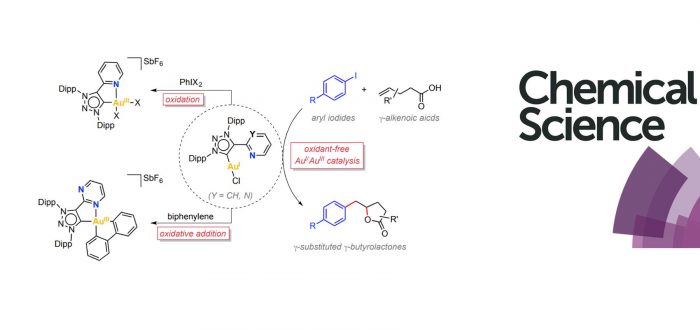This week, our member of IQCC Margarida Borrell was awarded the annual recognition of the best PhD thesis in 2021 (Premi Extraordinari) from the University of Girona. Last year, he defended with success her PhD thesis on “Small-molecule mimics of Rieske oxygenases. Application to selective aliphatic C-H hydroxylation and olefin syn-dihydroxylation”, supervised by Miquel Costas.
- sec.iqcc@udg.edu
- +34 972 41 83 57
Month: July 2022
Oxidant-free Au-catalyzed reactions are emerging as a new synthetic tool for innovative organic transformations. Still, a deeper mechanistic understanding is needed for a rational design of these processes. Here we describe the synthesis of two Au(I) complexes bearing bidentated hemilabile MICˆN ligands, [AuI(MICˆN)Cl], and their ability to stabilize square-planar Au(III) species (MIC = mesoionic carbene).
Eumelanin is the biopolymer responsible for photoprotection in living beings and holds great promise as a smart biomaterial, but its detailed structure has not been characterized experimentally. Theoretical models are urgently needed to improve our knowledge of eumelanin’s function and exploit its properties, but the enormous amount of possible oligomer components has made modelling not
New-to-nature radical biocatalysis has recently emerged as a powerful strategy to tame fleeting open-shell intermediates for stereoselective transformations. In 2021, it was introduced a novel metalloredox biocatalysis strategy that leverages the innate redox properties of the heme cofactor of P450 enzymes, furnishing new-to-nature atom-transfer radical cyclases (ATRCases) with excellent activity and stereoselectivity. Herein, it is
Next Friday will be the defense of the doctoral thesis of Lorena Capdevila Güell, titled “Chelation-assisted metal-catalyzed functionalization of strong: Csp2-H/Heteroatom bonds: Trapping intermediate species and unveiling mechanistic details”, supervised by Xavi Ribas from IQCC. Place: Aula Magna – Facultat de Ciències Date: July 22, 2022 Time: 10.30h We wish her good luck and all the best!
Next Wednesday will be the defense of the doctoral thesis of Eila Serrano-Hervás, titled “Computational studies of epoxide hydrolase-catalyzed ring-opening reactions”, supervised by Sílvia Osuna and Marc Garcia-Borras from IQCC. Place: Sala de Graus – Facultat de Dret Date: July 20, 2022 Time: 16.30h We wish her good luck and all the best! Girona, July 13, 2022 For
This Wednesday will be the defense of the doctoral thesis of Sergio Fernández Martín, titled “Development and mechanistic study of well-defined catalysts for the CO2 and H2O reduction reactions”, supervised by Josep Maria Luis from IQCC and Julio Lloret from ICIQ. Place: Auditorioum Prof. Dr. Killian Muñiz (Tarragona) and virtual Date: July 13, 2022 Time: 11h
A large number of 2D/2D and 3D/3D aromatic fusions that keep their aromaticity in the fused compounds have been synthesized. In addition, we have previously proven the electronic relationship between the 3D aromaticity of boron hydrides and the 2D aromaticity of PAHs. Here we report the possible existence of 3D/2D aromatic fusions that retain the
Dr. Galeotti has recently become a new member of the Institute of Computational Chemistry and Catalysis (IQCC) as a postdoc. Dr. Galeotti received his PhD in Chemistry from University of Rome “Tor Vergata” (Italy) in 2022. During his PhD, he worked with Prof. Massimo Bietti and Prof. Michela Salamone on factors governing reactivity and selectivity









